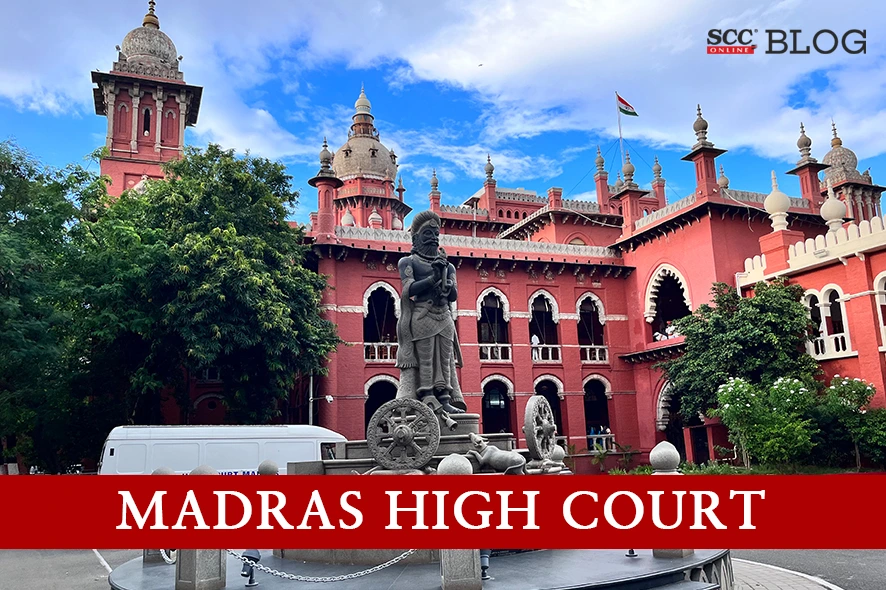Madras High Court: In two writ petitions filed calling for the records pertaining to the Provisional Attachment Order passed by the Deputy Director, Directorate of Enforcement (‘ED’) and the confirmation order passed by the Adjudicating Authority and quash the same and consequently direct the Special Director and Joint Director of Directorate of Enforcement to remove the attachment on the property, the division bench of M.S. Ramesh and Sunder Mohan*, JJ. while quashing the provisional attachment order passed by ED, and the confirmation order passed by the adjudicating authority, said that the provisional attachment is not in accordance with the law, thus all consequential actions cannot be sustained. Further, it directed the Sub Registrar to remove the encumbrance and issue a fresh encumbrance certificate
The petitioners vide sale deeds purchased an agricultural land. In 2010, various FIRs were filed against the accused persons for the offence under Sections 419, 420 and 471 of Penal Code, 1860 (‘IPC’). Simultaneously, the Directorate of Enforcement recorded Enforcement Case Information Reports (ECIR) or investigating under the Prevention of Money Laundering Act, 2002 (‘PMLA, 2002’).
On 11-10-2010, the provisional order of attachment was passed under Section 5(1) of the PMLA 2002, attaching 51 immovable properties in the possession of the said accused. Out of the 51 properties, the attachment of 7 properties was not confirmed by the adjudicating authority by the order dated 13-08-2012. The provisional attachment in respect of the properties that are subject matter in the second writ petition was not confirmed by the adjudicating authority, whereas the provisional attachment of the property which is the subject matter in first writ petition was confirmed by the adjudicating authority.
Aggrieved by the entries made in the encumbrance certificate reflecting the attachment of properties, in which the provisional attachment order was not confirmed, the petitioners have filed the second writ petition, seeking removal of the entries in the encumbrance certificate.
Aggrieved by the fact that no notice was issued before passing the provisional order of attachment in respect of the property in first writ petition, the petitioners have sought for the quashing of the provisional attachment order dated 11-10-2010
The issue was whether provisional attachment order passed under Prevention of Money Laundering Act, 2002 (‘PMLA’) by ED is valid after 180 days. Also, whether such attachment order can be sustained when no notice was issued to the actual owner of the property who is a third party to the PMLA proceedings.
The Court noted that the provisional attachment order was passed on 11-10-2010 after the petitioners had purchased the property in the year 2008. It is the case of the petitioners that they are bona fide purchasers and the ED have not established that it is an ‘Accommodation Sale’ made by the accused.
The Court further noted that the provisional attachment in respect of properties was not confirmed by the adjudicating authority. Though the ED sought liberty to re-investigate the transaction of the seven properties, which includes the petitioners’ property, the counter is silent about whether any reinvestigation was conducted.
The Court viewed that the attachment order for the properties concerned is no longer in force, and the entries in the encumbrance certificate must be removed. Therefore, the Court directed the Sub Registrar to remove the encumbrance forthwith and issue a fresh encumbrance certificate.
Further, the Court noted that the property sold to the petitioners was not brought to the adjudicating authority’s notice. Had it been brought to the notice of the adjudicating authority, the attachment of this property also would not have been confirmed by the adjudicating authority, as there is no difference between the properties, as both were purchased by the petitioners in the year 2008, much before the provisional attachment order.
The Court said that the petitioners have effective alternative remedies. However, in the peculiar facts and circumstances of the case, it viewed that the petitioners need not be relegated to approach the authorities, or the Special Court concerned, since the order passed by the adjudicating authority showed that, the fact that the petitioners purchased the property was not brought to its notice. Thus, the attachment of the property also cannot be sustained.
The Court noted that even in the counter, ED have not explained how the provisional attachment can be sustained on merits, in view of the sale in favour of the petitioners. Since the provisional attachment is not in accordance with the law, all consequential actions cannot be sustained.
Therefore, it quashed the provisional attachment order passed by ED, and the confirmation order passed by the adjudicating authority.
The Court allowed ED to take further action in accordance with law, if on further investigation it find that the sale is an ‘Accommodation Sale’ is sham and nominal.
[Nithesh Chaudhari v Special Director, 2024 SCC OnLine Mad 160, decided on 30-01-2024]
Advocates who appeared in this case :
For Petitioners: Senior Counsel M.Sricharan Rangarajan
For Respondents: Special Public Prosecutor Rajnish Pathyil








